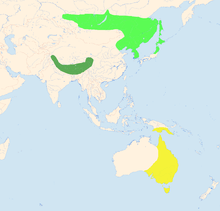White-throated needletail
| White-throated needletail | |
|---|---|
 | |
| Scientific classification | |
| Kingdom: | Animalia |
| Phylum: | Chordata |
| Class: | Aves |
| Order: | Apodiformes |
| Family: | Apodidae |
| Genus: | Hirundapus |
| Species: | H. caudacutus |
| Binomial name | |
| Hirundapus caudacutus (Latham, 1801) | |
 | |
| Northern summer Resident Northern winter | |
The white-throated needletail (Hirundapus caudacutus), also known as needle-tailed swift or spine-tailed swift, is a large swift. It is commonly reputed to reach speeds of up to 170 km/h (105 mph), though this has not been verified.[2][3][4]
These birds have very short legs which they use only for clinging to vertical surfaces. They build their nests in rock crevices in cliffs or hollow trees. They never settle voluntarily on the ground and spend most of their lives in the air, living on the insects they catch in their beaks.
These swifts breed in rocky hills in central Asia and southern Siberia. This species is migratory, wintering south in the Indian Subcontinent, Southeast Asia and Australia. It is a rare vagrant in Western Europe, but has been recorded as far west as Norway, Sweden and Great Britain. In June 2013, the bird was spotted in the United Kingdom, the first sighting in 22 years. This bird flew into a wind turbine and died; its body was sent to a museum.[5][6]
The white-throated needletail is a mid-sized bird, similar in size to an Alpine swift, but a different build, with a heavier barrel-like body. They are black except for a white throat and white under-tail, which extends on to the flanks, and a somewhat paler brown back.
The Hirundapus needletailed swifts get their name from the spiny end to the tail, which is not forked as in the Apus typical swifts.
The white-throated needletail was first described by the English ornithologist John Latham in 1801 under the binomial name Hirundo caudacuta.[7] The current genus Hirundapus is constructed from the names of the swallow genus Hirundo and the swift genus Apus. The specific caudacutus is from Latin cauda, "tail", and acutus, "pointed".[8]
See also
References
- ↑ BirdLife International (2012). "Hirundapus caudacutus". IUCN Red List of Threatened Species. Version 2013.2. International Union for Conservation of Nature. Retrieved 26 November 2013.
- ↑ trails.com
- ↑ travelalmanac.com Retrieved on 10 June 2009
- ↑ Newton
- ↑ "Birdwatchers flock to see rare bird, then watch it killed by wind turbine". Fox News. 28 June 2013. Retrieved 2013-06-29.
- ↑ Huyton, Harry (28 June 2013). "Let's not martyr the white-throated needletail to the anti-wind cause". London: The Guardian. Retrieved 2013-07-01.
- ↑ Latham, John (1801). Supplementum indicis ornithologici sive systematis ornithologiae (in Latin). London: Leigh & Sotheby. p. lvii.
- ↑ Jobling, James A (2010). The Helm Dictionary of Scientific Bird Names. London: Christopher Helm. pp. 94, 193. ISBN 978-1-4081-2501-4.
External links
 Media related to Hirundapus caudacutus at Wikimedia Commons
Media related to Hirundapus caudacutus at Wikimedia Commons Data related to Hirundapus caudacutus at Wikispecies
Data related to Hirundapus caudacutus at Wikispecies- Hirundapus caudacutus in the Flickr: Field Guide Birds of the World
- "Hirundapus caudacutus". Avibase.

